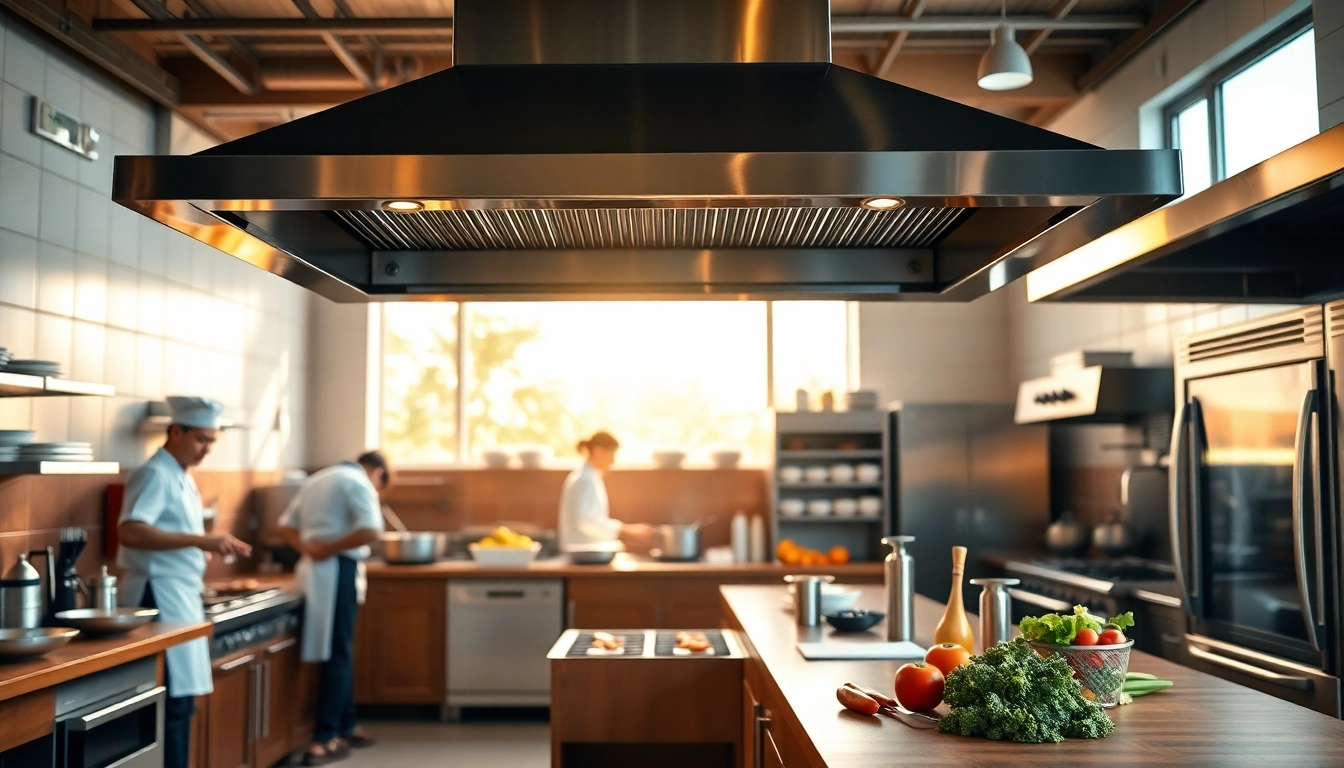Understanding the Importance of Restaurant Exhaust Hood Cleaning Service
In the bustling environment of a commercial kitchen, where meals are prepared in large quantities and at a rapid pace, maintaining a clean and operational kitchen is crucial. One of the key components of a well-functioning kitchen is the exhaust hood system. A Restaurant Exhaust Hood Cleaning service plays a pivotal role in ensuring that this system operates efficiently and safely. Let’s delve deep into why regular cleaning of restaurant exhaust hoods is essential.
Why Regular Cleaning is Necessary
Exhaust hoods are designed to remove smoke, heat, grease, and odors from the air, helping to maintain a comfortable and safe kitchen environment. However, without regular cleaning, these hoods can accumulate substantial amounts of grease and other contaminants. This buildup can cause several significant issues:
- Fire Hazards: Accumulated grease is highly flammable. According to fire safety regulations, improperly maintained hoods can become a severe fire risk in commercial kitchens.
- Reduced Efficiency: A dirty exhaust system can cause the entire ventilation system to work harder, leading to inefficiencies that can increase energy costs and wear on equipment.
- Regulatory Compliance: Health and safety regulations mandate that commercial kitchens be maintained to certain standards. Regular cleaning helps operators stay compliant and avoid penalties.
Health and Safety Standards for Commercial Kitchens
Restaurants must adhere to strict health and safety standards established by local health departments. The National Fire Protection Association (NFPA) codes require regular cleaning of kitchen hoods and ducts to prevent fires and ensure health safety. Regular maintenance not only meets these standards but also safeguards the health of staff and patrons by ensuring air quality stays high and free from potentially harmful particles.
Consequences of Neglecting Exhaust Hood Maintenance
Cuts in cleaning schedules can lead to dire consequences. Let’s look at some potential outcomes:
- Increased Fire Risk: It’s estimated that greasy exhaust systems lead to thousands of kitchen fires each year. Neglecting to keep these systems clean significantly elevates the risk of fires.
- Health Risks: Poor air quality can result in health issues such as respiratory problems for kitchen staff, which could lead to increased sick days.
- Financial Strain: Emergency repairs, regulatory fines, and loss of business during downtimes can be financially devastating; regular maintenance is cost-effective in the long run.
Best Practices for Restaurant Exhaust Hood Cleaning Service
Employing best practices in restaurant exhaust hood cleaning facilitates a safe working environment and ensures your kitchen operates smoothly. Here are some essential practices to consider:
Scheduled Cleaning Intervals
The frequency of cleaning is contingent upon several factors, including the volume of food being prepared and the types of cooking methods used. Generally, the NFPA recommends:
- Monthly Cleaning: For high-volume kitchens, such as those in fast-food restaurants.
- Quarterly Cleaning: For establishments with moderate cooking activity.
- Biannual to Annual Cleaning: For low-volume or fine dining restaurants.
Establishing a regular cleaning schedule will help to maintain safety and efficiency in your kitchen.
Choosing the Right Cleaning Techniques
There are various methodologies for cleaning exhaust systems, and the right technique depends on the buildup level and the system design. Techniques include:
- Wet Cleaning: This method uses a combination of water and detergents to remove grease and other debris.
- Duct Cleaning: A thorough inspection and cleaning using specialized equipment to remove obstructions within the ducts.
- Foam Cleaning: Employing foaming agents to cling to greasy surfaces, allowing for thorough breakdown before rinsing.
Selecting the right cleaning method can effectively enhance the overall performance of your exhaust system.
Essential Tools and Equipment for Effective Cleaning
The use of specialized tools enhances the cleaning process. Key tools include:
- Pressure Washers: Ideal for quickly removing grease and grime from larger surfaces.
- Scrapers and Brushes: To manually remove stubborn grease buildup.
- Vacuum Systems: To eliminate debris following the cleaning process.
Investing in the right equipment not only ensures a thorough job but also helps protect your staff from the dangers of hazardous cleaning materials.
Identifying When Your Kitchen Needs Exhaust Hood Cleaning Service
It’s crucial to recognize the signs indicating when your kitchen needs the Restaurant Exhaust Hood Cleaning service. Identifying these signs early can save you from extensive damage and fire risks.
Signs of Buildup and Poor Air Quality
Some common indicators of accumulated grease include:
- Visible Grease Residue: If you can see grease accumulating around the hood or on the filters, it’s high time for a cleaning.
- Odors: Unpleasant smells persistently lingering in the kitchen can indicate poor air quality due to grease buildup.
- Increased Smoke: If your kitchen starts to fill with smoke during cooking, this indicates that the exhaust system is not functioning correctly.
Evaluating Performance Metrics of Your Exhaust System
Regularly evaluating your exhaust system’s performance can help catch issues early. Monitoring the following metrics can be helpful:
- Airflow Rate: Use an anemometer to measure airflow, which should meet manufacturer specifications.
- Noise Levels: Unusual loud noises may indicate that the system is working harder than necessary to function properly.
- Energy Consumption: An increase in energy bills might signal that the exhaust hood is not running efficiently, perhaps due to grease buildup.
Recognizing the Impact on Kitchen Operations
The performance of a well-maintained exhaust hood system directly impacts kitchen operations. Some consequences of neglecting maintenance include:
- Frequent Breakdowns: A poorly maintained exhaust hood can lead to frequent repairs, disrupting daily operations.
- Staff Efficiency: If the kitchen is too hot or filled with smoke, staff productivity can plummet, impacting service quality.
- Diminished Customer Experience: Buildups can lead to unpleasant dining environments, which may deter customers from returning.
Choosing a Professional Restaurant Exhaust Hood Cleaning Service
Selecting the right professional service for your exhaust hood cleaning needs is equally important for maintaining your kitchen’s health and safety standards. Here are critical factors to consider:
Key Qualifications to Look For
When vetting cleaning services, seek out those that possess:
- Certification: Look for certifications from organizations like the International Kitchen Exhaust Cleaning Association (IKECA).
- Experience: Ensure that the service provider has a track record of working with kitchens similar to yours.
- Insurance: Confirm that they carry liability insurance and worker’s compensation to protect your establishment during the cleaning process.
Understanding Service Offerings and Customizations
Not all cleaning services are created equal. It is essential to understand the specific offerings of the service, including:
- Descaling and Degreasing: Ensure that they utilize effective degreasing agents and techniques tailored to your kitchen’s needs.
- Follow-Up Services: Inquire if they offer follow-up inspections or other maintenance packages.
- Emergency Services: Determine if they provide emergency cleaning services in case of urgent needs.
Assessing Customer Reviews and Experiences
Customer feedback can offer insights into a service’s reliability and effectiveness. Look for:
- Online Reviews: Analyze feedback on platforms like Google and Yelp to gauge customer satisfaction.
- Referrals: Ask for referrals from industry peers to find trusted services.
- Case Studies: Request case studies or examples of previous work to evaluate their commitment to quality and efficiency.
Long-term Benefits of Regular Restaurant Exhaust Hood Cleaning Service
Prioritizing exhaust hood cleaning brings numerous long-term advantages beyond just compliance. Here’s what you can look forward to:
Enhancing Kitchen Efficiency and Longevity
A clean exhaust hood allows for optimal airflow, facilitating better energy efficiency and extending the life of your equipment. Over time, this translates into fewer repairs and replacements, resulting in significant cost savings.
Improving Air Quality and Employee Well-Being
Maintaining a clean exhaust system ensures the air quality in your kitchen remains high. This environment promotes well-being and productivity among your staff, reducing absenteeism and increasing job satisfaction.
Cost-Effectiveness of Regular Maintenance
The investment in regular Restaurant Exhaust Hood Cleaning service reduces the risk of major repairs and average downtime caused by maintainable failures. With proper maintenance schedules, the overall operational costs can significantly decrease, making it a smart investment for any restaurant owner.



